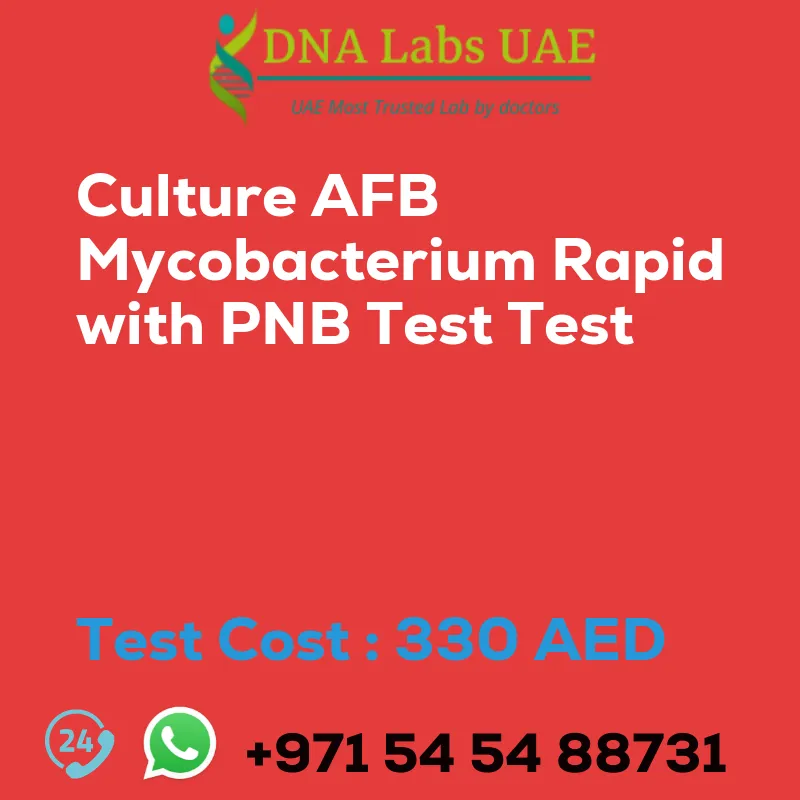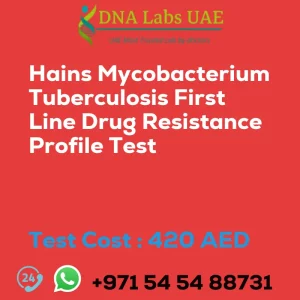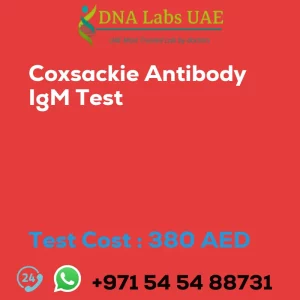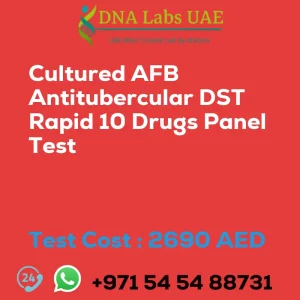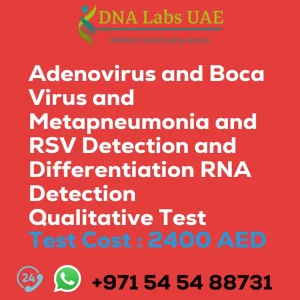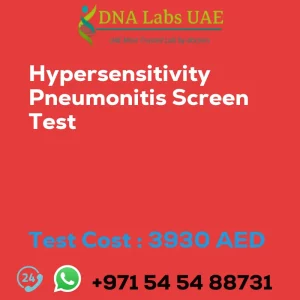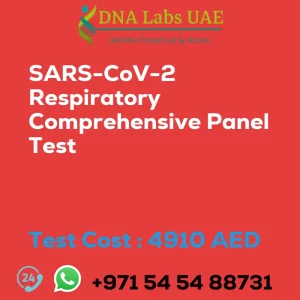CULTURE AFB MYCOBACTERIUM RAPID WITH PNB Test
Test Cost: AED 330.0
Introduction
The Culture AFB (Mycobacterium) Rapid with PNB Test is a laboratory test used to identify the presence of Mycobacterium tuberculosis complex (MTBC) in a patient’s sample. MTBC is a group of bacteria that includes the bacteria responsible for causing tuberculosis (TB).
Test Components
This test does not include ANTI-TUBERCULAR DRUG SENSITIVITY.
Price
The cost of this test is AED 330.0.
Sample Condition
- Blood/Bone Marrow: Collect 8 mL (5 mL min.) Blood/Bone marrow in Myco F/Lytic bottle available from LPL. Mix by gentle inversion 8-10 times. Ship at 18-22°C.
- CSF: Collect 2 mL (1 mL min.) CSF in a Red Top (No Additive) tube or sterile screw capped container. Do not use SST gel barrier tubes. Ship refrigerated.
- Pus/Body fluids (Pleural/Pericardial/Ascitic/Synovial/Ocular) Aspirates/Semen/BAL/Bronchial washings: Submit as much as possible (1 mL min.) in sterile screw capped container. Ship refrigerated.
- Endometrial curettings/Tissue: Submit in sterile normal saline in a sterile screw capped container. Ship refrigerated.
- Swabs: Submit swabs in 1 mL sterile normal saline in sterile screw capped container. Ship refrigerated.
- Sputum/Urine: Submit 2 Spot (random) morning samples, 5-10 mL (1 mL min.) sputum / 10 mL (5 mL min.) urine in sterile screw capped container. Do not pool the samples. Ship refrigerated.
- Gastric Lavage: Submit 5-10 mL (2 mL min.) gastric lavage in a sterile screw capped container. Ship refrigerated. Overnight fasting is mandatory.
Report Delivery
Sample Daily by 3.30 pm
Report Interim: 14 days & 4 weeks
Final: 6 weeks
PNB test: 10 days after AFB culture is positive
Method
Rapid Automated Fluorescent AFB Culture and Automated AFB Identification by PNB test
Test Type
Tuberculosis
Doctor
Physician
Test Department
Pre Test Information: Overnight fasting is mandatory for Gastric Lavage specimens.
Test Details
The Culture AFB (Mycobacterium) Rapid with PNB Test is a laboratory test used to identify the presence of Mycobacterium tuberculosis complex (MTBC) in a patient’s sample. MTBC is a group of bacteria that includes the bacteria responsible for causing tuberculosis (TB). The test involves obtaining a sample, such as sputum or tissue, from the patient suspected of having TB. The sample is then cultured in a specialized medium that promotes the growth of mycobacteria. The culture is incubated for several weeks to allow the bacteria to grow. After incubation, the culture is examined for the presence of acid-fast bacilli (AFB), which are characteristic of mycobacteria. AFB stain is performed to visualize the bacteria under a microscope. If AFB are observed, it indicates the presence of mycobacteria. In addition to the AFB stain, the PNB (para-nitrobenzoic acid) test is performed to differentiate between different species of mycobacteria. This test determines the ability of the bacteria to metabolize PNB. MTBC, including M. tuberculosis, is PNB-resistant, while other non-tuberculous mycobacteria are PNB-sensitive. By combining the AFB stain with the PNB test, the laboratory can identify whether the mycobacteria present in the patient’s sample belong to the MTBC or are non-tuberculous mycobacteria. This information is crucial for the appropriate diagnosis and treatment of TB. It is important to note that this test is performed in a laboratory setting and requires specialized equipment and expertise. The results of the test are interpreted by trained laboratory professionals, and the final diagnosis is made by a healthcare provider based on the clinical presentation and other diagnostic tests.
| Test Name | CULTURE AFB MYCOBACTERIUM RAPID WITH PNB Test Test |
|---|---|
| Components | Does not include ANTI-TUBERCULAR DRUG SENSITIVITY |
| Price | 330.0 AED |
| Sample Condition | Blood\/Bone Marrow:Collect 8 mL (5 mL min.) Blood\/Bone marrow in Myco F\/ Lytic bottle available from LPL. Mix by gentle inversion 8\u0192??10 times. Ship at 18\u0192??22?\u00f8C.\nCSF:Collect 2 mL (1 mL min.) CSF in a Red Top (No Additive) tube or sterile screw capped container. Do not use SST gel barrier tubes. Ship refrigerated. Pus\/Body fluids (Pleural\/ Pericardial \/Ascitic\/Synovial\/Ocular) Aspirates\/ Semen \/BAL \/ Bronchial washings: Submit as much as possible (1 mL min.) in sterile screw capped container. Ship refrigerated.\nEndometrial curettings\/Tissue: Submit in sterile normal saline in a sterile screw capped container. Ship refrigerated.\nSwabs:Submit swabs in 1 mL sterile normal saline in sterile screw capped container. Ship refrigerated. \nSputum\/Urine:Submit 2 Spot (random) morning samples, 5\u0192??10 mL (1 mL min.) sputum \/ 10 mL (5 mL min.) urine in sterile screw capped container. Do not pool the samples. Ship refrigerated.\nGastric Lavage:Submit 5\u0192??10 mL (2 mL min.) gastric lavage in a sterilescrew capped container. Ship refrigerated. Overnight fasting is mandatory. |
| Report Delivery | Sample Daily by 3.30 pm ReportInterim: 14 days & 4 weeks Final: 6 weeks PNB test: 10 days after AFB culture is positive |
| Method | Rapid Automated Fluorescent AFB Culture and Automated AFB Identification by PNB test |
| Test type | Tuberculosis |
| Doctor | Physician |
| Test Department: | |
| Pre Test Information | Overnight fasting is mandatory for Gastric Lavage specimens. |
| Test Details | The Culture AFB (Mycobacterium) Rapid with PNB Test is a laboratory test used to identify the presence of Mycobacterium tuberculosis complex (MTBC) in a patient’s sample. MTBC is a group of bacteria that includes the bacteria responsible for causing tuberculosis (TB). The test involves obtaining a sample, such as sputum or tissue, from the patient suspected of having TB. The sample is then cultured in a specialized medium that promotes the growth of mycobacteria. The culture is incubated for several weeks to allow the bacteria to grow. After incubation, the culture is examined for the presence of acid-fast bacilli (AFB), which are characteristic of mycobacteria. AFB stain is performed to visualize the bacteria under a microscope. If AFB are observed, it indicates the presence of mycobacteria. In addition to the AFB stain, the PNB (para-nitrobenzoic acid) test is performed to differentiate between different species of mycobacteria. This test determines the ability of the bacteria to metabolize PNB. MTBC, including M. tuberculosis, is PNB-resistant, while other non-tuberculous mycobacteria are PNB-sensitive. By combining the AFB stain with the PNB test, the laboratory can identify whether the mycobacteria present in the patient’s sample belong to the MTBC or are non-tuberculous mycobacteria. This information is crucial for the appropriate diagnosis and treatment of TB. It is important to note that this test is performed in a laboratory setting and requires specialized equipment and expertise. The results of the test are interpreted by trained laboratory professionals, and the final diagnosis is made by a healthcare provider based on the clinical presentation and other diagnostic tests. |

